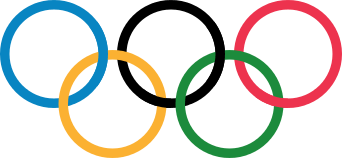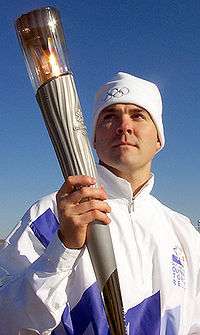Olympic Charter
| Olympic Games Jeux olympiques (French)[1] |
|---|
 |
| Main topics |
| Games |
The Olympic Charter is a set of rules and guidelines for the organization of the Olympic Games, and for governing the Olympic movement. Its last revision was on the 9 September 2013.
Adopted by International Olympic Committee (IOC), it is the codification of the fundamental principles, rules and by-laws. French and English are the official languages of the Olympic Charter.
Purpose
Throughout the history of the Olympics, the Olympic Charter has often decided the outcome of Olympic controversy. As expressed in its introduction, the Olympic Charter serves three main purposes:
- to establish principles and values of Olympism
- to serve as IOC law
- to define the rights and obligations of the four main constituents of the Olympic movement: the International Olympic Committee (IOC), the International Federations and the National Olympic Committees, and the Organizing Committees for the Olympic Games.
Main components
With its 5 chapters and 61 articles, the Olympic Charter outlines in detail several guidelines and rules. This article highlights and summarizes those items considered most important to governing the Olympic Games, the Olympic movement, and its three main constituents: the International Olympic Committee, the International Federations, and the National Olympic Committees.
Chapter 1: The Olympic Movement and its Action
Article 2: The mission of the IOC is to promote Olympism throughout the world and to lead the Olympic Movement. This includes upholding ethics in sports, encouraging participation in sports, ensuring the Olympic Games take place on a regular period, protecting the Olympic Movement, and encouraging and supporting the development of sport.
Article 6: The Olympic Games are competitions between athletes in individual or team events and not between countries.

Article 8: The Olympic symbol consists of five interlocking rings which, from left to right are blue, yellow, black, green and red.
Chapter 2: The International Olympic Committee (IOC)
This chapter outlines the membership, meetings, and guiding doctrines of the International Olympic Committee (IOC).
Chapter 3: The International Federations (IFs)
Chapter 3 discusses the role of International Federations (IFs) in the Olympic movement. IFs are international non-governmental organizations that administer to sports at the world level and encompass organizations administering such sports at the national level. For each sport that is part of the Olympic Games, an International Federation exists. These IFs work to ensure their sports are developed in a way that agrees with the Olympic Charter and the Olympic spirit. With technical expertise in its particular sport, an IF has control over eligibility for competition as well as details of the venue in which the athletic competition takes place.
Chapter 4: The National Olympic Committees (NOCs)
Article 28: The mission of the National Olympic Committees (NOCs) is to develop, promote and protect the Olympic Movement in their respective countries. The role of NOCs within each country is to promote the spirit of Olympicism, ensure the observance of the Olympic Charter, and to encourage ethics in and development of sports. They are in charge of their country's representation at the Games, deciding on a host city for the Games, and cooperation with governmental and non-governmental bodies during the Games.
Chapter 5: The Olympic Games
This chapter addresses the celebration of the Olympic Games, the selection of the host city, the eligibility code for participation in the games, those sports included in the Games, media coverage, publications, and propaganda allowed for the Games.
In addition, Section 3 of this chapter discusses applicable protocol for Olympic functions and events. This includes an outline of use of the Olympic flag, flame, and opening and closing ceremonies. The five rings of the Olympic games signify the five continents.
Fundamental Principles of Olympism
- Olympism is a philosophy of life, exalting and combining in a balanced whole the qualities of body, will and mind. Blending sport with culture and education, Olympism seeks to create a way of life based on the joy of effort, the educational value of good example, social responsibility and respect for universal fundamental ethical principles.
- The goal of Olympism is to place sport at the service of the harmonious development of humankind, with a view to promoting a peaceful society concerned with the preservation of human dignity.
- The Olympic Movement is the concerted, organised, universal and permanent action, carried out under the supreme authority of the IOC, of all individuals and entities who are inspired by the values of Olympism. It covers the five continents. It reaches its peak with the bringing together of the world’s athletes at the great sports festival, the Olympic Games. Its symbol is five interlaced rings.
- The practice of sport is a human right. Every individual must have the possibility of practising sport, without discrimination of any kind and in the Olympic spirit, which requires mutual understanding with a spirit of friendship, solidarity and fair play.
- Recognising that sport occurs within the framework of society, sports organisations within the Olympic Movement shall have the rights and obligations of autonomy, which include freely establishing and controlling the rules of sport, determining the structure and governance of their organisations, enjoying the right of elections free from any outside influence and the responsibility for ensuring that principles of good governance be applied.
- Any form of discrimination with regard to a country or a person on grounds of race, religion, politics, gender or otherwise is incompatible with belonging to the Olympic Movement.
- Belonging to the Olympic Movement requires compliance with the Olympic Charter and recognition by the IOC.[2]
In the media
The Olympic Charter is not simply a matter of unenforced policy for the Olympic Games. Throughout history, it has served as guidance for the proceedings of the Games. Below are a few of the most recent examples:
- May 2004: Bernard Lagat became a US citizen three months before he ran track in Athens and won the silver medal in 2004. The glitch is that he won the medal for Kenya, which does not allow dual citizenship, and the Olympic Charter requires each athlete to be a citizen of the country he or she competes for. Lagat was permitted to retain his medal, but had to wait until 2007 before being eligible to compete in any other international athletics events.
- December 2004: It was discovered that Marion Jones, five-time track and field medalist at the 2000 Sydney Olympics, may have been on several banned steroids and hormones when she competed. Because the Olympic Charter states that no decision taken at the Olympic Games can be challenged after a period of three years after the closing ceremony, Jones could not lose these medals involuntarily except for doping violations. Jones was later stripped of every Olympic medal dating back to September 2000 after admitting that she took performance-enhancing drugs.
- 2011 / 2012: Human Rights Watch accused Saudi Arabia of contravening the Olympic Charter by systematically preventing women from practicing sports in the country, and by not allowing Saudi women athletes to take part in the Olympic Games, thus violating the fourth, sixth and seventh fundamental principles of the Charter, which every member of the Olympic Movement is bound to. This came as Anita DeFrantz, chair of the I.O.C.'s Women and Sports Commission, suggested that the country be barred from participating in the Olympics until it agrees to send women athletes to the Games. I.O.C. spokeswoman Emmanuelle Moreau, however, indicated that the Committee "would not mandate that the Saudis have female representation in London", arguing that "the I.O.C. does not give ultimatums nor deadlines but rather believes that a lot can be achieved through dialogue".[3][4][5]
- 2012: The Lebanese judo team at the 2012 London Olympics refused to practice next to the Israeli one, and a makeshift barrier was erected to split their gym into two halves. The two teams were scheduled to use the same gym and mats at London's new ExCeL center for their final preparations. However, the delegation from Lebanon would not train in view of the Israeli team, and insisted some sort of barrier be placed between them. Organizers accepted the Lebanese coach’s demand to separate the teams, erecting a barrier so that the Lebanese team would not see the Israeli one.
Protection of Olympism as a belief
There has been a suggestion from lawyers that, in the UK, those with a strong belief in Olympism could benefit from protection against discrimination in exactly the same way that followers of Islam, Christianity, Judaism or any other religion are protected.[6]
See also
Notes and references
- ↑ "Jeux Olympiques - Sports, Athlètes, Médailles, Rio 2016". olympic.org.
- ↑ "Olympic Charter" (PDF). International Olympic Committee. Retrieved 7 February 2014.
- ↑ "Ban Urged on Saudi Arabia Over Discrimination", New York Times, 15 February 2012
- ↑ "Qatar decision to send female athletes to London 2012 increases pressure on Saudi Arabia", Inside the Games, 1 July 2010
- ↑ "Hurdles the biggest Olympic barrier for Saudi women", Associated Press, 18 February 2012
- ↑ Heys, Tom (2012-08-22). "Journal - Olympism - a protected belief?". Lewis Silkin. Retrieved 2014-02-06.

